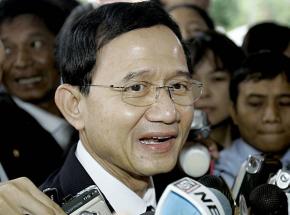A coup by any other name
looks at the background to Thailand's judicial coup.
A COURT ruling has ousted Thailand's democratically elected government by dissolving the ruling party just two years after a military coup against a government run by the same political forces.
Thailand's Constitution Court ostensibly made its December 2 ruling based on election law violations by the ruling People's Power Party (PPP). Some 108 members of the PPP are banned from politics under the decision.
But the court's timing was obviously the result of mass protests by the opposition People's Alliance for Democracy (PAD), which had blockaded Bangkok's two main airports.
The PAD has been trying to oust the PPP, the successor party to the exiled former prime minister Thaksin Shinawatra, who was ousted by the military in September 2006. The military junta subsequently rewrote the constitution to favor opposition forces. But in elections held in 2007, Thaksin's allies won a clear majority and formed a government.
The PAD accuses Thaksin of corruption and authoritarian tendencies, charges for which there is plenty of evidence.

However, the PAD demands not more democracy, but less. It proposes a parliament substantially composed of appointed members. It is openly monarchist--its supporters wear the royal color yellow--and it has openly fascist elements. Its political base is the Bangkok middle class that resented Thaksin's populist measures, which have created a solid voting bloc among the rural poor.
The Wall Street Journal explained the social roots to this polarization:
A few decades ago, Thailand was a largely agrarian society, with a relatively small income gap between urban and rural residents. Then globalization swept the country, as foreign investors descended upon Thailand to take advantage of its low-cost labor pool--a phenomenon later repeated in China.
From 1985 to 1995, Thailand was the fastest-growing economy in the world, and it became a manufacturing platform for the world, with large multinationals including Ford Motor Co. and other American, Japanese and European companies making investments.
Much of the wealth accrued to Bangkok, a once-charming city of canals and temples that spawned gleaming office towers and roadways clogged with Mercedes-Benz sedans. Rural residents, who migrated in and out of the city working in factories or on construction sites, felt left out as the income gap widened further.
AFTER WINNING election in 2001, Thaksin, a wealthy telecommunications magnate, instituted a debt moratorium and health care subsidies that provided relief to Thai peasants devastated by the East Asian financial crash of 1997-98. These measures enabled Thaksin to win reelection in 2005. When a court invalidated that election in 2007, Thaksin was preparing to seek office again when the army seized power.
Prior to the coup, Thaksin had been under pressure from a genuine pro-democracy movement that organized mass protests against corruption and Thaksin's domination of the military.
Today, however, the country is polarized on a different basis. On one side is the urban middle class and government elites who want to defend their traditional privileges. On the other is the poor who are mobilized by the businessmen tied to Thaksin. The PPP has launched a protest group of its own, the United Front for Democracy Against Dictatorship, whose supporters wear red. Some 20,000 members turned out to protest the court's decision December 2.
The PAD, however, has the advantage of the implicit backing of the army and King Bhumibol Adulyadej. The party has repeatedly used force and intimidation to try yo bring down the government, including the occupation of the offices of Prime Minister Somchai Wongsawat, which took place with no real action by police.
Under the terms of the judge's order, members of the PPP will form a new party, Pua Thai, that will still hold the majority in parliament. But there is much speculation that the military will pressure the parliament to form a "government of national unity," to be run by a PAD supporter. It's possible that the courts could declare the entire 2007 election to be null and void, thereby forcing a new vote.
It isn't clear what approach the incoming U.S. administration of Barack Obama will take toward Thailand. The U.S. deepened its longstanding military ties to Thailand under Thaksin's government, but made only token objections to the 2007 coup.
What the U.S. wants from this key ally is "stability"--even if that requires another coup.
The Thai left is trying to rebuild an independent pro-democracy movement to counter the PAD and its right-wing and military backers. Those efforts will be essential to defending democracy in Thailand.


